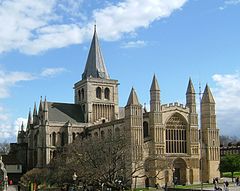| Rochester | |
|---|---|
| Town | |
 Rochester Cathedral viewed from the west at Castle Gardens | |
Location within Kent | |
| Population | 62,982 (2011 Census)[1] |
| OS grid reference | TQ739684 |
| Unitary authority | |
| Ceremonial county | |
| Region | |
| Country | England |
| Sovereign state | United Kingdom |
| Post town | ROCHESTER |
| Postcode district | ME1, ME2 |
| Dialling code | 01634 |
| Police | Kent |
| Fire | Kent |
| Ambulance | South East Coast |
| UK Parliament | |
Rochester (/ˈrɒtʃɪstər/ ROTCH-iss-tər) is a town in the unitary authority of Medway, in Kent, England. It is at the lowest bridging point of the River Medway, about 30 miles (50 km) from London. The town forms a conurbation with neighbouring towns Chatham, Rainham, Strood and Gillingham. Rochester was a city until losing its status as one in 1998 following the forming of Medway and failing to protect its status as a city, the first city to do so in the history of the United Kingdom. There have been ongoing campaigns to reinstate the city status for Rochester.[2][3] In 2011 it had a population of 62,982.
Rochester was for many years a favourite of Charles Dickens, who owned nearby Gads Hill Place, Higham,[4] basing many of his novels on the area. The Diocese of Rochester, the second oldest in England, is centred on Rochester Cathedral and was responsible for founding a school, now The King's School, in 604 AD,[5] which is recognised as the second oldest continuously running school in the world. Rochester Castle, built by Bishop Gundulf of Rochester, has one of the best-preserved keeps in either England or France. During the First Barons' War (1215–1217) in King John's reign, baronial forces captured the castle from Archbishop Stephen Langton and held it against the king, who then besieged it.[6]
As well as the historic centre, the suburbs of Borstal and The Delce are also part of Rochester, forming part of the Medway Towns urban area with a population of about 250,000.
- ^ UK Census (2011). "Local Area Report – Rochester Built-up area sub division (E35001444)". Nomis. Office for National Statistics. Retrieved 9 August 2020.
- ^ "Error costs Rochester city status". BBC. 16 May 2002. Retrieved 10 July 2021.
- ^ Edwards, Jade. "Medway announces intention to enter Her Majesty The Queen's city status competition". Medway Council. Retrieved 10 July 2021.
- ^ "Gads Hill Place - Discover Gravesham". www.discovergravesham.co.uk. Archived from the original on 11 December 2016. Retrieved 28 December 2014.
- ^ "King's Rochester - First Rate Independent Education". www.kings-rochester.co.uk. Archived from the original on 13 January 2017. Retrieved 28 December 2014.
- ^ "English Heritage Rochester Castle". English-heritage.org.uk. Archived from the original on 5 March 2010. Retrieved 1 September 2010.
